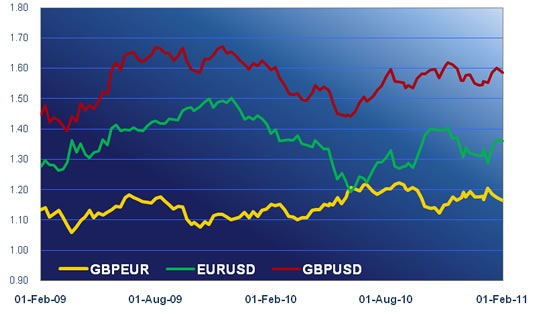– Kiwi lower on recession warning
– Chinese interest rates to rise further
Good morning. The French newspaper Libération clearly does not take its own title too literally when it comes to matters of national security. It has chosen the British ski instructor to replace the Polish plumber as a blue collar hate figure. Apparently the Alps are overrun with Brits bent on pinching the jobs of poor ski instructors whose only bankable skill is saying “bend your knees” in two languages. Libération claims the Brits are turning up on time for work every day, so messing up the system and spoiling it for everyone else.
| Technical levels | |||||||||||||
|
|||||||||||||
| Economic releases | |||||||||||||
|
|||||||||||||
And the chancellor spoiled it for sterling yesterday when he began the day with an announcement that he would be bringing forward his levy on banks, going for a big-bang approach rather than phasing it in gradually. Not that it is particularly big, as bangs go; the collective combined extra cost to banks will be no more than £800 million. Some of them will be paying out more than that in bonuses over the next couple of months. But psychologically, and in the absence of anything else upon which to focus, it put a damper on the pound and the stock market. The levy will be linked to balance sheet size. The more the banks lend, the higher the levy. The tax is tiny, 0.1% on short term liabilities and just 0.05% on long-term borrowings, but it isn’t the most obvious inducement for banks to make more loans.
The pound was not quite the worst performer on the day, that honour went to the Swiss franc. It was one of the main laggards though, giving up nearly a cent against the US dollar and more than half a cent against the euro. The franc’s ongoing problem is that it strengthened steadily as long investors wanted its safe-haven protection against financial and economic woes. Now they are regaining their confidence they are not so bothered about that perceived safety. Accompanying sterling among the tail-enders was the New Zealand dollar. As with sterling it was the finance minister that spoiled it for the Kiwi. Bill English told parliament it was “possible” the NZ economy slipped into recession in the second half of last year.
Tuesday’s economic statistics passed by without incident. Swiss unemployment was steady at 3.8%. German industrial production fell by -1.5% in December. Canadian housing starts were lower than expected at 170.4k and the previous month’s figure was downwardly revised. In a not entirely unexpected move the People’s Bank of China raised its policy interest rate by 25 basis points to 6.06% and its one-year deposit rate to 3.0%. That leaves the deposit rate still well below the near-five per cent rate of inflation and analysts anticipate further rate increases in coming months.
Today opened with an improvement in Westpac’s index of Australian consumer confidence from -5.7% to +1.9% and an acceleration in the BRC’s shop price index from 2.1% to 2.5%. Japanese consumer confidence was a point higher at 41.1 and Japanese machine tool orders in January were 89.4% higher than the same month last year.
Germany has announced an improved trade surplus of €14 billion for December and Britain is next up with its own December trade imbalance. There is nothing else on the agenda until around midnight when Japan reports on core machinery orders and Australia reveals January’s employment data. Federal Reserve Chairman Ben Bernanke speaks this afternoon on the US economy and the dollar. Absent any surprises from the data or the Fed chairman it looks like another day of aimlessness.






